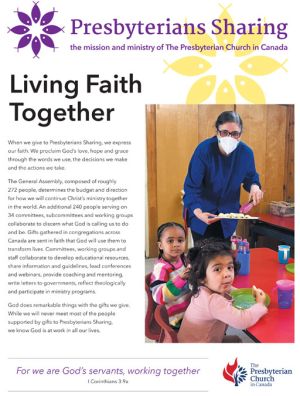Stewardship and Money
Stewardship is about responding to the call of God in our lives with all our gifts – time, talent and treasure. Even though it makes us uncomfortable to talk about our finances, what we do with our money is a large part of stewardship.
There are over 2,500 Bible passages that talk about money and material possessions – more than any other subject! When we don’t talk about money, it exerts a powerful influence in our lives – at home, at work, or in the church. It’s simply not biblical or healthy to be anxious, afraid or cynical about money.
If we learn to talk about money, like Jesus does in the Bible, it begins to feel more comfortable. By talking about financial stewardship throughout the year – both what we do with our money and how we can share it –through preaching, reporting, bulletins and children’s messages, we can connect our lives with God’s mission.
Find tools to help your congregation talk about money, use bulletin inserts, explore different ways to say thank you, analyze and celebrate the gifts given to your congregation with a generosity assessment, and learn how to set up legacy funds.
“We give thee but thine own, whate’er the gift may be; all that we have is thine alone, a trust, O Lord, from thee.”
Book of Praise, #661
Learn about Different Ways to give $:
Tools and Information for Congregations
Regularly updated as regulations and practices change, the latest treasurers’ handbook can be found here. The handbook provides useful checklists for first time treasurers and links to other useful resources. It covers frequently asked questions, the church budget, paying church staff, clergy housing, banking, receipts, charitable activities, disbursements, government regulations, financial statements, reports and returns.
A narrative budget takes the church’s mission of worship, nurture, service, and evangelism and then resorts and summarizes the line-item budget into those categories. A narrative (or “missional”) budget tells the story of your church’s mission and ministry, making it come alive. People are not moved by line items—they give in support of your church’s vision and how you plan to accomplish it. People want to know that the money they give is changing lives. To see an example narrative budget, click here.
In J. Clif Christopher’s book, Not Your Parents Offering Plate, the author describes 3 savings “pockets”. The church actively seeks gifts from the earned-income pocket in the form of regular offerings. But the church must also seek gifts from the other pockets. The capital-pocket can include savings, an insurance policy or an inheritance, any of which might be donated to a church’s capital campaign. The estate pocket holds the accumulated assets that a person might donate to the church at the time of death. Learn more about asking for gifts from the other pockets.
Does your minister know who is giving and how much they give? A recent study showed that 50% of ministers avoid such knowledge and that those churches are more likely to experience financial challenges. Churches in which clergy are actively aware of giving data are more likely to be growing financially. Read What Clergy Should Know to learn more.
Resources that Talk about Money (Free)

Presbyterians Sharing: Living Our Faith Together
Share how Presbyterians Sharing stewards gifts from congregations and individuals as it supports the overall mission and ministry of the Presbyterian Church in Canada.
Webinar:
Jesus talks about money; we can too.
Talking about money can feel scary. This webinar discusses how to talk about money from a Biblical perspective in a joyful and generous way. Did Jesus really mean we had to give away all we had to follow him? What does the tithe mean today? Starting with the principle that “money follows mission,” this presentation discusses how people are motivated to give and ways to motivate giving with sincere stories of lives changed.
For more information about Stewardship & Planned Giving, send us an email or call 1-800-619-7301. ext. 272.




